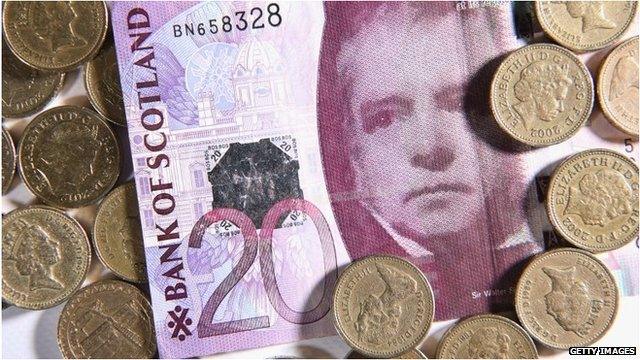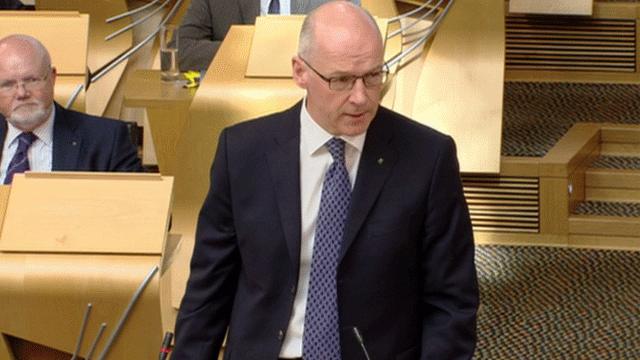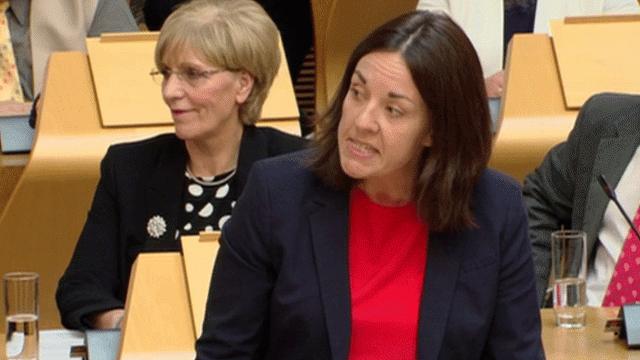John Swinney defends SNP's full fiscal autonomy amendment to Scotland Bill
- Published

Full fiscal autonomy would allow Scotland to have control of all areas of tax and spending except defence and foreign affairs
Scotland's Deputy First Minister John Swinney has backed his party's bid to have Full Fiscal Autonomy (FFA) included in the Scotland Bill.
His defence came as new Office for Budget Responsibility figures predicted falling North Sea oil revenues.
During FMQs at Holyrood, Scottish Labour's Deputy Leader Kezia Dugdale asked Mr Swinney what oil price was needed to balance the books under FFA.
The SNP minister responded by saying FFA would allow economic growth.
Mr Swinney, who was standing in for First Minister Nicola Sturgeon until she returns from a four-day visit to the US, added: "Our GDP per head used to be sixth in the UK, now it is now third only behind London and the South East.
"Our productivity has increased from 96% of UK levels in 1999 to being in line with UK levels in 2012.
"The moral of the story is where we can exercise distinctive economic policies in Scotland, we can transform the economic performance of this country, and for me that is what fiscal autonomy is all about."

What is full fiscal autonomy (FFA)?
Holyrood would have control over all of taxation in Scotland.
For shared UK costs it would pay Whitehall a portion of the takings for defence and the Foreign Office.
Those in favour say it would provide real power to grow the economy faster.
Those against say it would leave a large gap in the nation's finances - a £7.6bn shortfall in the next financial year, over and above a share of the deficit that the UK is already running.
To find out more read Douglas Fraser's FFA explainer written during the election campaign.

Ms Dugdale's line of questioning focused on research her party had done on the price of oil under FFA.
She said the country would need a global oil price of $200 (£129) to "balance Scotland's books". The price stood at about $65 on Thursday afternoon.
Ms Dugdale said: "So disastrous is the SNP's policy, that it is predicated on an oil price that has never been reached before."
Analysis by the Institute for Fiscal Studies (IFS) said that in 2015/16 Scotland would have a shortfall or "fiscal gap" of £7.6bn.
The independent research body explained that if Scotland controlled tax and spend through FFA it would lose cash transfers from the rest of the UK, leaving it with the choice of tax increases or spending cuts.
Income tax
Earlier, the SNP - which won 56 out of Scotland's 59 seats at the election - had made public that it would submit an amendment to the Scotland Bill, external calling for the Scottish Parliament to be able to introduce full fiscal autonomy.
The party's Westminster leader Angus Robertson said the current proposals for more devolved powers, which are based on the Smith Commission recommendations, "do not go far enough".
He added: "We are also seeking to amend the Scotland Bill to give the Scottish Parliament the ability to introduce full fiscal autonomy."
As it stands, the Bill's new powers for Holyrood include;
setting income tax rates and bands
controlling a proportion of VAT raised in Scotland
fully controlling air passenger duty
creating new benefits in devolved areas and making discretionary welfare payments
and managing the assets of the Crown Estate
However, full fiscal autonomy would go further and give the Edinburgh parliament the responsibility for all areas of tax and spending except defence and foreign affairs.
However, responding to the SNP's plan to submit its FFA amendment, Scotland would probably face tax increases or spending cuts under plans for full fiscal autonomy advanced by the SNP. That's according to the Institute for Fiscal Studies. The IFS says that if Scotland controlled its own tax and spending it would lose cash transfers from the rest of the UK. Autonomy could allow Scotland to pursue better policies which would generate growth. But the institute notes that "the consequences of the short run arithmetic are not easily avoided."

John Swinney defended his party's bid to amend the Scotland Bill to include FFA for Scotland

Kezia Dugdale said her party had done its own research on oil prices under FFA for Scotland
After the Conservative's won the UK election with an overall majority, Prime Minister David Cameron said he did not support full fiscal autonomy for Scotland, stating that it would mean £7bn of cuts or extra tax-raising.
Following a meeting Ms Sturgeon in mid-May, Mr Cameron said: "Let's make sure Smith is implemented in full.
I'm going to keep the commitment I made to the people of Scotland. Let's get that done first because it does create a really strong Scottish Parliament.
"Of course, if people want to make future proposals I'll look at them."
- Published11 June 2015